The first page opened with a poem, "Help One Another," reprinted from "Chambers, Journal;" followed by "7482 Feet High," a letter to the Man-on-the-Band-Stand from M. Burgess, about her journey to California. This page also began a letter from Peoria student Edith Abner, entitled "Visit to Washington D.C." which continued on the fourth page.…
Indian Helper, The (1885-1900)
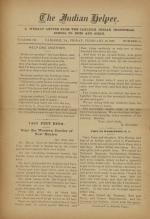

The first page opened with a poem, " A Short Sermon," followed by a letter to the Man-on-the-Band-Stand dated Feb 7, 1888 from M. Burgess, entitled "A Sleeping Car," about the comforts of traveling in a sleeping car, which continued on page four. Page two featured a report called "The Full Exhibit Of The Carlisle Indian School, For…
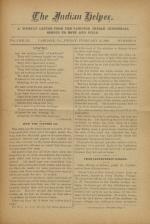
The first page opened with a poem, "Sowing," followed by the article, "How the Letters Go," that described the process of express mail retrieval and distribution from trains. Then came a letter from former student John Dixon [Dickson] (Pueblo) who wrote about his experiences translating for and recruiting students for the Albuquerque Indian…
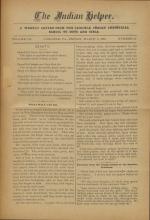
The first page opened with a poem, "Beauty," followed by the article, "What Will Can Do," and "Extracts from the Compositions of the Smaller Scholars." Page two began with "His Lesson," about atoning for bullying, reprinted from "Bright Jewels," followed by several articles, "Little Things," "School," and a letter to the Man-on-the-Band-Stand…
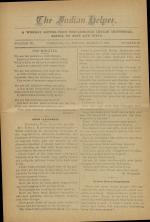
The first page opened with a poem, "The Minutes," followed by Marianna Burgess' letter "From California," to the Man-on-the-Band-Stand describing idyllic weather compared to what she's hearing of blizzard conditions at the school. The second page began with an account of the visit and talk by Mr. Kanzo Uchumiura, a Japanese student visiting the…
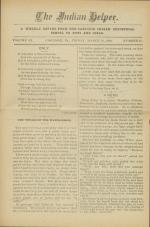
The first page opened with a poem, " Only," followed by a piece called "The Voyage of the Water Drops," about how rain is formed. The last article on this page is called "A Hero," about how the actions of a quick thinking boy saved a mine in Newcastle, England. The second page featured an article, "Mines," in which "Miss Alice" described the…
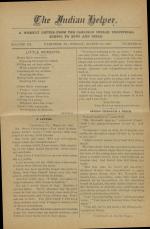
The first page opened with a poem, "Little Moments," followed by "A Letter," dated March 21, 1888 describing some of the Man-On-the-Band-Stand's observations. The next feature was an article about how to build a periscope. It was titled "Seeing Through a Brick," and continued on the fourth page. Page two included a detailed description of the…
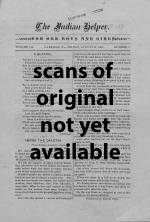
The first page opened with the poem, " A Proverb," followed by Jemima Wheelock's (Oneida) report of "Our Wilmington Trip," about a group of students traveling to Delaware where they stayed with families before they headed to Philadelphia with Capt. Pratt and Miss Leverett. They visited John Wannamaker's Store, the zoo, an iron factory and…
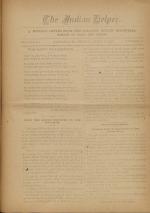
The first page opened with a poem "The Happy Philosopher," followed by "From the Indian Question to the Weather," a piece describing stereotypical prejudices and the importance of keeping Indians away from idle influences. Then came a report, "Our Guardhouse," extracted from essays by Richard Davis (Cheyenne) and Frank Dorian (Iowa) that…
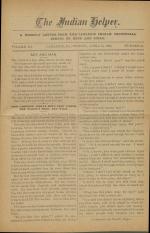
The first page opened with a poem, "Boy and Man," followed by "Two Carlisle Indian Boys Stop Under the Walnut Tree, and Talk," contrasting an honest, hard working boy to a lazy, ungrateful boy. It continued on the fourth page. Page two featured news and greetings from returned students, an article "School Room Sentences," that encouraged…
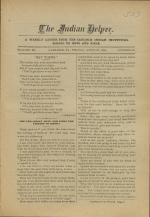
The first page opened with a poem, "Get There," followed by an editorial from Ethildred B Barry of Germantown, called "Are the Indian Boys and Girls the Friends of Birds?," on the treatment of birds. It continued on the fourth page. Page two opened with a piece describing the contents of the April "Red Man," a report from Susan Longstreth…
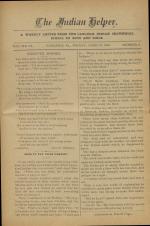
The first page opened with a poem by John G. Whittier, "Granted Wishes," followed by Aunt Martha's story, "Does It Pay to Be Unkind?" about a former Carlisle student's lack of cooperation by not translating business dealings from English after returning home. The second page featured news items about returned students, and a report about "The…
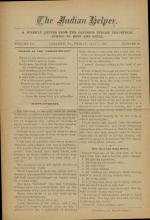
The first page opened with a poem "Legend of the 'Forget-Me-Not, '" "From the Scrap-book of a subscriber;" followed by an article called "Happy Accidents," about the importance of self-help. Next came a piece that continued on the fourth page entitled "How Boys Can Make Money." Page two began with the news of the death of Etahdleuh Doanmoe,…
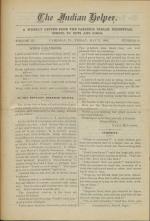
The first page opened with a poem "Work a Blessing," followed by a letter "To the Republic Debating Society," from Nancy McIntosh (Creek) reporting her position as teacher in Eufala, Indian Territory. The last article on this page was entitled "Curiosity," which continued on page four. Page two listed many small news items about returned…
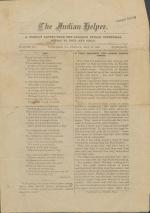
The first page opened with a poem, "Try," followed by a blurb against tobacco use and by "A Visit Through the Lower School Rooms," that reported the activities of students in the lower grades. It continued on page four. The second page bore news of students out in the country, the "disgraceful" portrayals of Indians by Buffalo Bill's Wild West…
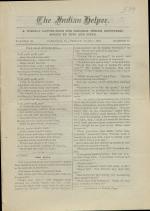
The first page opened with a poem, "The Old Steam Mill," followed by a fictitious conversation between two Carlisle Indian School students, Tom and Ben discussing the merits of work and study. It continued on page four. Page two included news from Pine Ridge Agency, and of the Standing family’s trip to Liverpool, the value of repeating unknown…
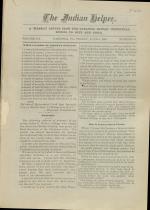
The first page opened with the poem, "What a Barrel of Whiskey Contains,” followed by an article titled “Welcome!” that reprinted Kish Hawkins’ (Cheyenne) address to a visiting group of Wilson College women. In the talk he described the Outing Program, industrial work, academic work and women’s suffrage. The final article on the page was “How…
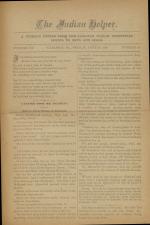
The first page opened with an untitled poem, followed by “A Letter from Mr. Standing: How He Finds Things in England,” a travel diary of the Standing Family’s visit to England. Page two included a report of “An Aged Friend,” and news about visits Dr. Given made to Outing students in Bucks County. It also reported a Department of Interior…
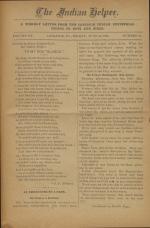
The first page opened with a poem “Selected by Susan Longstreth,” titled “To My Dog ‘Blanco’” by J.G. Holland. The other feature on the first page was an account of “An Indian Girl on a Farm: She Enjoys a Holiday,” that described Adelia Lowe (Sioux) and Frances King’s (Quapaw) trip to Burlington, New Jersey, which continued on the fourth page.…
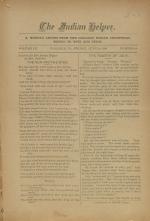
The first page opened with a poem selected “by Mrs. Pettinos,” titled “The Sun and the Wind,” followed by a conversation about the meaning of the 4th of July and how an Indian School student might be influenced to extend his time at the school instead of returning to the reservation. Page two included letters from Frank Lock (Sioux) on outing,…
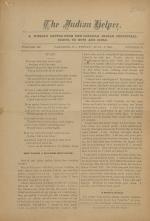
The first page opened with a poem by Sarah E. Eastman reprinted from “Golden Days,” titled “If! If!” followed by the reprinted letter from a Carlisle Indian School student on Outing called “She Wants a Higher Education.” The last piece on the page continues on the fourth page called “A Modern Pueblo” about the process by which a progressive…
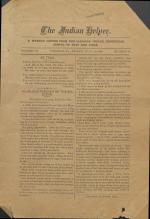
The first page opened with the poem “Be True” followed by an article titled “A Carlisle Teacher on the Big Ocean,” about a trip aboard the Steamer Aurania dated July 6th, 1888 written for the Man-on-the-band-stand by “A Carlisle,” aka Miss Lowe. The article concluded on the fourth page. Page two featured a variety of small newsy paragraphs that…
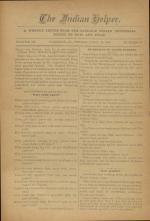
The first page opened with the death notice for Katie Kinshone, one of the Apache babies. It was followed by a poem by Henry Sargent Blake called “Why Come They?” The next item was an article, “No Tobacco in Other Schools,” about the evils of tobacco use and the last piece on the page was an excerpt from an Oneida boy’s outing letter called “…
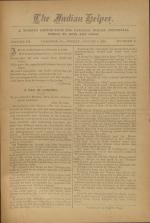
The first page opened with an untitled selection, opening with the line, “A Man of kindness to his beast is kind,” followed by “A Day In London,” dated July 12, 1888, signed by “A Carlisler,” who is later revealed to be Miss Lowe, and continued on to the fourth page. The report included a visit to St. Paul’s Cathedral, Westminster Abbey,…
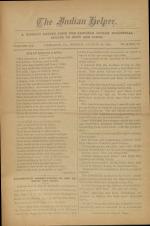
The first page opened with the poem, “What Makes A Man,” followed by an article titled, “Interesting Observations At the Indians’ Own Home” reprinting a letter from Joshua Given (Kiowa) who described the social and political news from the Kiowa and Comanche Agency. He reported the activities of students who had returned home from Carlisle. The…
